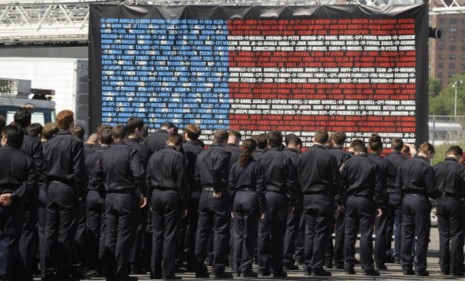5 ways Rescue Me succeeded in handling 9/11 on TV
The New York firefighter drama ends Wednesday night, after seven seasons of capturing the complicated aftermath of our national tragedy

A free daily email with the biggest news stories of the day – and the best features from TheWeek.com
You are now subscribed
Your newsletter sign-up was successful
In 2004, Rescue Me became the first scripted television show to directly address the effects of 9/11 on America. Over its seven seasons, the show, which stars Denis Leary as a veteran New York City firefighter grappling with alcoholism and the death of his cousin in the 9/11 attacks, has alternately been called both brave and insensitive. With the series finale set to air Wednesday night — just four days before the 10th anniversary of the attacks — critics are reflecting on Rescue Me's groundbreaking portrayal of 9/11. Here, five talking points:
1. Rescue Me accomplished the "impossible"
As the nation reeled from tragedy, says Randee Dawn at MSNBC, it was "impossible to imagine" that a TV show could possibly make sense of 9/11. Yet that's precisely what Rescue Me did. Many assumed that viewers wouldn't "watch a show about such a painful time," says FX executive Tim Brooks. But Rescue Me offered a way to "refract our national outrage and sadness," says David Wiegand at the San Francisco Chronicle. The show "helped us personalize not only what survivors and family members are still going through a decade later, but maybe what [the rest of us] are feeling as well."
The Week
Escape your echo chamber. Get the facts behind the news, plus analysis from multiple perspectives.

Sign up for The Week's Free Newsletters
From our morning news briefing to a weekly Good News Newsletter, get the best of The Week delivered directly to your inbox.
From our morning news briefing to a weekly Good News Newsletter, get the best of The Week delivered directly to your inbox.
2. It gave us a protagonist whose imperfect reaction mirrored our own
Many people internalized the tragedy in ways that were alternately virtuous and destructive. Leary's troubled firefighter, Tommy Gavin, was a cathartic stand-in for that kind of reaction, says Tim Molloy at The Wrap. "Tommy wasn't an Everyman. He was better and worse." His inner turmoil reflected our own, says Matthew Gilbert at The Boston Globe, and we saw ourselves in "his raving hostility and cynicism, his challenged ideals, his unremitting sorrow." Yet underneath it all was his — and our — burning desire to do good.
3. It taught us to laugh off the tragedy
Rescue Me found the "humor in sad situations and the sadness of lighter moments," says Rick Bentley at the Kansas City Star. Whenever things got too heavy on the show, says Molloy, "there was some banter about a penis that resembled a baby carrot, or a flatulent girlfriend, or an endless array of cheap stereotypes." It's the same humor that those who struggled to overcome the grief of the tragedy used, says show creator Peter Tolan. "This is how people move forward."
A free daily email with the biggest news stories of the day – and the best features from TheWeek.com
4. It honored and appealed to firefighters
The life of a firefighter portrayed on Rescue Me was certainly "dizzying," says Gilbert, swinging from "firehouse buffoonery to alcoholic grimness," from "a whisper to full-on alarm in a matter of moments." But firefighters quickly became some of the most passionate supporters of the show. "It showed we weren't angels and were just doing a job," says firefighter Lt. John Kilbane. We're a "functionally dysfunctional family."
5. It mercifully was not heavy handed
When looking back at the heroism of 9/11, films and TV shows too often film through a rose-colored lens, turning acts of bravery into pandering schmaltz. But Rescue Me avoided that tendency, says Molloy. "It handled its heavy questions without heavy-handedness or judgment." It showed the human capacity to "do great things, utterly waste our time, or hurt people around us — all at once."
Sources: Boston Globe, Kansas City Star, MSNBC, San Francisco Chronicle, St. Petersburg Times, Wrap
Editor's Note: This article originally misidentified the relative whose death Denis Leary's character was grappling with. It has since been corrected. We regret the error.